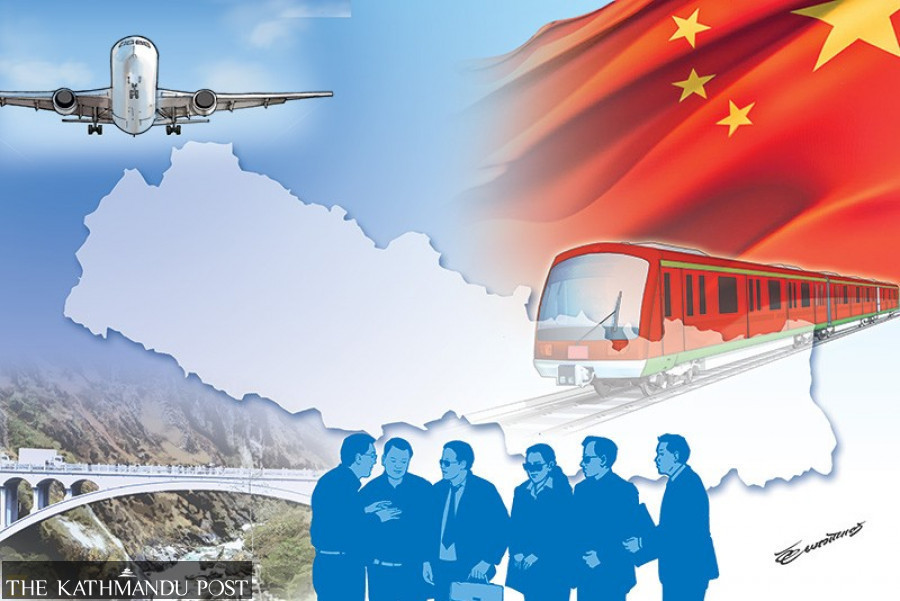Columns
Creating a space for investment
We must devise suitable policies, remove bureaucratic hurdles, and guarantee returns to attract foreign investors.
Kalyan Raj Sharma
Nepal is all set to host the third Nepal Investment Summit on April 28-29. This event will bring together business leaders and investors from India, China, Bangladesh, Japan, the UK, the USA, the UAE, Sri Lanka, and others. As the government prepares for the summit and hosts various pre-Investment Summit seminars through its diplomatic missions in major countries, it is pertinent to consider its significance and impact.
Nepal needs foreign investment to fill the financing gaps and obtain economic development. Located between two economically prosperous neighbours, the country has immense opportunities for the production and service sectors. However, we lag in economic growth and face trade deficits. According to the Department of Foreign Employment, 771,327 youths went abroad for foreign employment in the fiscal year 2022-23, mostly to the Gulf nations and Malaysia. This means that the workforce is leaving the country in droves. The agricultural lands remain fallow. The industry sector has performed poorly, and agricultural production is still insufficient to sustain the demand. Farmers and debtors are on the streets protesting. According to the Centre for Crop Development and Agro Bio-diversity Conservation, Nepal produces only about 5.5 million tonnes of rice instead of approximately 7.9 million tonnes needed for self-sufficiency.
Foreign investments
We have had some foreign investments in mega and small projects. Examples include Indian investment in the Arun or Upper Karnali hydro project, Chinese investment in the Hongshi and Huaxin cement projects, Korean investment in the Upper Trishuli hydro project, and Singaporean investment in the Risen Solar project. However, new investments are a rarity, with some big companies even leaving the country. Citing the challenging business landscape in Nepal, Malaysia's Axiata Group, the parent company of Ncell, decided to exit Nepal at the end of last year. Before the summit, a thorough analysis of the reasons is imperative to address the investors' concerns.
Let's take the case of Nepal's northern neighbour, China, the largest foreign direct investment (FDI) source and second-largest trading partner, followed by India. There has been a huge surge in Chinese investment commitments in the Nepali market in the past few years. Chinese companies have shown great interest in investing in Nepal, particularly in the hydro-energy sector. This has been the most sought-after area for Chinese investment.
Many Chinese companies invested in hydropower projects like Upper Marsyangdi A, Upper Tamakoshi, Langtang-Bhotekoshi projects, and others with the hope that they would successfully generate benefits for Nepal and themselves. But India’s reluctance to import Nepal’s electricity with Chinese involvement, be it in investment, equipment, or even manpower, has had a dampening effect. This decision pushed back Chinese investors who lost hope in their Nepali investment.
Following this, Nepal and India signed a power trade agreement in January to export 10000 megawatts (MW) of hydroelectricity to India in the next decade. The contract is said to be for 25 years and will be automatically renewed.
This means that Chinese investment doesn’t have space in the Nepali energy sector. Amid this reality, Chinese investors lost confidence in investing in Nepal. The government hosted pre-investment summits in different Chinese cities like Beijing (March 26), Chengdu (March 25) and Yiwu (March 28). The Investment Board of Nepal briefed about the investment environment and shared the relevant Acts, policies and the possible investment sectors. Deputy Prime Minister Narayan Kaji Shrestha called the investors for participation in the summit after attending the event in Beijing and welcomed investments.
But this couldn’t convince the Chinese friends who shared that there is no hope for the Nepali investment scene. They are mostly interested in the hydro sector, and according to them, if the generated power cannot reach the market, their investment, time, effort and energy is wasted. As they are unsure what will happen next, Chinese investors are stepping back from investing in other sectors, too. Before calling them for investment again the Nepal government should be able to answer their concerns and provide a solid base ensuring the return on their investments and a robust financial foundation.
Regarding India, many hydropower projects are facing legal and local hurdles. There is an example of a project deal between Nepal and Grandhi Mallikarjuna Rao (GMR) Energy of India to develop the Upper Karnali Hydropower, which faced court and other delays. Most power projects have cost and time over-run. Problems in land acquisition and local protests have been common as forest hurdles.
Removing hurdles
Not just hydropower, another prospective sector, tourism, also has its constraints. The road connectivity of Kathmandu to major cities Pokhara, Lumbini and Chitwan says it loud and clear. The poor road condition adds the time and cost burden to projects, and also on trade. Air connectivity and unequal fare treatment between domestic and foreigners have been an outstanding issue forever. The lack of youth and hence the shortage of skilled manpower in the country is another constraint.
Nepal needs to create an enabling environment for investment in the country, but before that, it should sustain trust among investors. Merely inviting foreign investors, without ensuring political and policy stability, ending administrative mechanisms, creating hassle-free processes, and clarifying legal and policy issues, isn’t ideal.
The impact of the investment summit should be measured in the long run. Our acts and regulations should be clear, our policies should be investment-friendly, the bureaucratic system should be smooth, and investment return should be guaranteed. Without these, investors wouldn’t be attracted towards Nepal. Otherwise, why would they be interested in Nepal’s old narrative of a peaceful environment and inexperienced labour when they can invest equally in other countries and earn better returns? We must consider these issues to ensure that the upcoming summit does not become just a regular conference of foreigners, with investment commitments but no implementation.




 11.12°C Kathmandu
11.12°C Kathmandu















